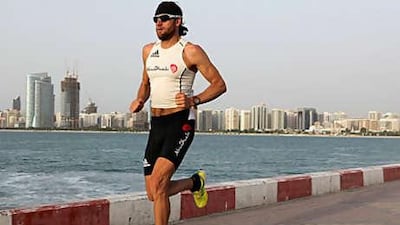An Ironman Triathlon consists of a 3.9km swim, followed by a 180.3km bike ride and the small matter of a marathon run - 42.2km - to finish. There is a time limit of 17 hours to complete the race, meaning competitors can be hauled off the course even with the finish line in sight. Surely you would have to be slightly unhinged to even consider it? All that pain and effort, stretched out across all the hours of sunlight a day has to offer.
All of which begs the question: Why? "I want to see where my limits are," said Faris al Sultan, with a logic that may be clear to other triathletes, if not to the wider public. "I have got pretty close," he said from Germany. "Every triathlete who competes in Ironman is looking for that perfect race, but you will never have that perfect race. "On the one hand, I won Hawaii, which is the best race that is out there. But, on the other hand," the "Sultan of Sweat" trails off. He clearly has some unfinished business. He is yet to find those limits.
Al Sultan is the leader of one of the world's top professional triathlon teams, Team Abu Dhabi. Back in 2005, he won the tradition-steeped Ironman World Championships in Kona, Hawaii, which is the triathlete's equivalent of winning the World Cup. He will take the next step in his preparations for the next World Championships, which will be run in October, when he competes at the Ironman 70.3 UK today in Somerset.
"Faris is one of a group of not many guys who really like the conditions in Hawaii," said Werner Leitner, a former triathlete who was recruited to manage Team Abu Dhabi when his close friend, al Sultan, first set up the team. "Last year he was not in his best shape, and still finished 10th. If everything works well for him this time, I think he can be in the top three again." When Leitner said al Sultan was "not in his best shape", it is clearly relative. This is someone who is used to dealing with pain.
Al Sultan, 32, last weekend won his most recent race, in his native Germany, and was eight minutes ahead of his nearest rival at the end - even though he had only recently returned from injury. A stress fracture he had suffered to his pelvis was not diagnosed at first. He continued running, hoping the pain would pass. Eventually the source of his pain was discovered, meaning seven weeks off from training for the run, Sultan's least-favoured triathlon discipline.
The son of a German mother and Iraqi father, al Sultan resists typecasting. He is Muslim yet was once sponsored by a brewery. Obviously, fasting during Ramadan is unfeasible for someone who earns his living running triathlons. However, his knowledge of religion is deep, thanks in part to his studies. He was reading for a masters in Arabic language, literature and history, in his home city of Munich, before he decided on a career in triathlon.
He spends a large part of the year in training in Al Ain and Abu Dhabi, and is thankful for the varied life he leads. "The work ethic [needed for triathlon] is more German," he said of his influences. "On the other hand, Arabic virtues are often more helpful in every day life. "Arabs are usually patient and generous, and I think I have a little bit of those virtues in me. For triathlon, specifically, you need a lot of ambition and you have to work hard."
It used to be that working hard meant poring over books at the Ludwig Maximilian University. He gave up pursuit of a graduate degree only when two professional triathletes finished behind him in a race and urged him not to waste the bright future he had in the sport. So he pursued a career in pain-management rather than academia. He concedes all those intellectual tools count for nought when exhaustion hits on the course.
"I remember one time in Hawaii when I was worried about whether I had switched off the lights in my apartment," he said, while analysing how the mind works during a triathlon. "When exhaustion comes in, your mind takes so much longer to function. "When you are on a bike and you are on a high gradient, you are under so much physical stress that to think a thought takes so much more time than it does when you are sitting and relaxed.
"To think one simple thing is so time-consuming. One simple thought might take five minutes." He said examination of a course often can tell a triathlete "exactly where those dark points will come". "You know you are usually going to feel bad after 30kms on the bike and 20kms of the run. After that, it really gets tough," he added. "I remember when I did my first Ironman, those dark moments were half-an-hour long.
"Now the dark moments are smaller, maybe just a couple of minutes. You are programmed to run through those dark moments."


